First results from a Euro-African partnership
 I am currently visiting Mozambique and work with the Ministry of Education and a consortium of 12 Universities of South Africa and Mozambique which are interested to develop professional higher education.
I am currently visiting Mozambique and work with the Ministry of Education and a consortium of 12 Universities of South Africa and Mozambique which are interested to develop professional higher education.
From our university we were invited by the project Latfure (https://wordpress.com/page/ulf-ehlers.net/30) to share our experiences with our dual study model at the Baden-Wurttemberg Cooperative State model (www.dhbw.de) which is Europe’s largest dual mode university and where for the past six years I have been serving as Vicepresident. I am here with my colleagues Nicole Graf and Raimund Hudak from our Heilbronn Campus.
I find that there is a big interest in professional higher education, and that Mozambique is very much looking to the turn from student success rates as indicator of quality in universities to employability as quality indicator. That is why we have discussed the experiences which we made in Europe with the development of professional higher education. I brought in several presentations and interventions our experiences from Germany (DHBW – www.dhbw.de) and from Europe, especially from my experiences from working with EURASHE (www.eurashe.eu)
Important results from our research project HAPHE came up again: Read the final REPORT incl. the framework for professional higher education. For any further information please contact me or my colleague Raimund.
Some key points came up which I would like to share here:
- Professional higher education (PHE) is our mission in higher education anyway, and not another paradigm: the term dual studies, integrated studies or practice integration turns out to be not useful for our discussion. It too much hints at a systems-change which is NOT necessary. A bit as if it is necessary to invent another higher education system for bringing in more professional orientation. So, during the discussions we brought up the idea that it might be useful to think about the integration of more practice/ professional elements into higher education in terms of a continuum. With more or less elements oriented to integrating professional experiences into higher education.
- Work placements are the start, and they are a GOOD start: it is clear: Every academic program can be enhanced through elements of PHE. One which is already in place at some curricula at the Universidad Eduardo Mondlane in Mozambique is a work placement for students during the last semester. We suggested to intensify this element and to integrate more placements, maybe also in an earlier stage of the study program already. Also important it is to integrate moments of reflection into the academic program, where students are ask to present what they learned during their practice exposure. Only then, it can become an integrated experience and contributes to academic learning. A third element is integrating of regular assignments and assessments during the practice phase. This is an element which is already marking a high degree of integration because it means that students are actually asked to integrate an academic exercise from their university during their work placement
- Find peers from the world of work to come to the table – representing the world of work in higher education is eminent important: An additional element of professional higher education is to invite representatives from the world of work or from a body representing the world of work (chambers of commerce, e.g.) to the table. Universities can do so by means of setting up an advisory board or organising regional workshops to invite the opinions from companies and practice organisations. It is important to extend an invitation – in order to create trust and foster mutual understanding and valuing each other’s contributions.
- PHE is not only for the well-developed professions but can integrate also informal and emerging professions: It has been a big point of discussion, if professional higher education can also be beneficial for those sectors in African economy which are characterised very much through emerging and informal professions. In Mozambique, it is estimated that approx. 60% of the economy is working in an informal not regulated economy (the small fisher, the tradesperson on the street, etc.). How to bring this into a meaningful academic program. We strongly believe and argued that this is possible. And it might be a breakthrough to view it like that. Because that means that also the small and hidden professions in Mozambique and South Africa can be addressed, for example with start-up programs.
Many things remain to be worked out. But for that – we have the project LATFURE. And the Latfure project will provide regular updates in our discussing and pogress: (https://wordpress.com/page/ulf-ehlers.net/30)

